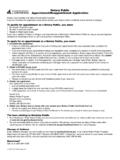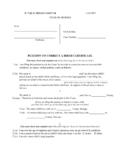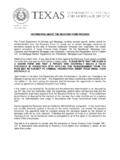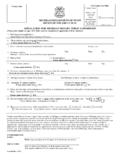Transcription of Information and Instructions for Commissioners …
1 _____ Information AND Instructions For Commissioners for oaths This guide is prepared to assist Commissioners for oaths . It is not legal advice. If you are in need of legal advice, please consult a lawyer. If anything in this booklet is inconsistent with the Notaries and Commissioners Act or the Commissioners for oaths Regulation, the act and regulation govern. December 2016 Contents Definitions .. 1 The Role and Responsibilities of Commissioners for oaths .
2 2 What Commissioners for oaths Can Do .. 2 Affidavits and Statutory Declarations .. 3 A Commissioner for oaths May be Called to Give Evidence .. 4 Criminal Liability of a Commissioner for oaths .. 4 A Spouse s Oath, Affirmation or Declaration .. 4 Taking Affidavits or Statutory Declarations ..4 How to Administer an Oath to a Person Making an Affidavit .. 4 How to Administer an Affirmation to a Person Making an Affidavit .. 5 How to Administer a Solemn Declaration to a Person Completing a Statutory Declaration .. 7 Alterations.
3 8 The Jurat .. 8 Name and Appointment Expiry Date or Office .. 9 Exhibits .. 9 When a Person is Visually Impaired or Unable to Read .. 9 When a Person Does not speak English .. 10 When a Person is Hearing Impaired .. 11 Additional Information for Appointed Commissioners for oaths ..12 Re-appointment of a Commissioner for oaths .. 12 Change of Employment or Address .. 13 Inquiries about appointment of Commissioners for oaths . 13 Contents Statute and Regulation .. 13 Code of Conduct for Commissioners for oaths .
4 14 SAMPLE Affidavit ..16 SAMPLE Statutory Declaration ..17 Definitions Affidavit A written statement formally confirmed by swearing an oath or affirming before a competent authority, such as a Commissioner for oaths . Affidavits are often used as evidence in court. Affidavits can only be used when a statute or regulation authorizes the use of an affidavit. Affirmation A solemn statement that is not religious, confirming that a statement is true. It has the same effect as an oath. An affirmation can be used if a person objects to swearing an oath.
5 Attest To affirm the truth of a statement or bear witness to something. Deponent A person who gives evidence in writing. The person who makes an affidavit is the deponent. Exhibit Evidence in the form of records or other documents that are meant to support a person s affidavit. Exhibits are frequently found annexed, or attached to, affidavits. Jurat Describes when, where, and before whom an affidavit was sworn. The jurat appears at the end of the document and must be completed by the Commissioner for oaths . Oath A solemn statement attesting to the truth of a statement to a Supreme Being or something sacred to the person taking the oath.
6 The person making the oath considers it to be binding on their conscience. 1 Solemn Declaration A promise to tell the truth that is used for statutory declarations. Statutory Declaration A formal declaration made in a prescribed form that has legal force similar to an oath or affidavit. Statutory declarations are used when no law authorizes the use of an affidavit. The Role and Responsibilities of Commissioners for oaths Commissioners for oaths perform important functions in our society. They are expected to comply with the highest standards of behaviour as set out in the Notaries and Commissioners Act and the Commissioners for oaths Regulation.
7 The regulation includes a Code of Conduct that is reproduced in this booklet. What Commissioners for oaths Can Do Commissioners for oaths in the Province of Alberta can administer oaths and take and receive affidavits, affirmations and declarations in and for Alberta. A person may be a Commissioner for oaths by virtue of office (ex officio), as set out in the Notaries and Commissioners Act. A Commissioner for oaths may also be appointed. A person may apply to be appointed as a Commissioner for oaths if they: Are at least 18 years old, and Reside in Alberta or in the part of the City of Lloydminster that is located in Saskatchewan The work of Commissioners for oaths must be authorized by the Notaries and Commissioners Act.
8 Section 19 of that Act provides that anyone who 2 acts as a Commissioner for oaths without authorization can be liable for a fine of up to $5,000. Commissioners for oaths are not authorized to do types of work usually done by lawyers, such as conveyancing. The Legal Profession Act prohibits anyone who is not a lawyer or member of the Law Society of Alberta from practising law or from representing themselves as a lawyer. Anyone who performs the work of a lawyer when they are not authorized to do so contravenes these provisions and may be prosecuted.
9 Only judges and lawyers have the authority to: Witness or certify and attest deeds, contracts and commercial instruments Issue a certificate under the Guarantees Acknowledgment Act Affidavits and Statutory Declarations Affidavits are written statements that are formally confirmed by oath or affirmation. The deponent (person making the affidavit) must swear the oath or affirm before a person with the power to administer an oath or affirmation, such as a Commissioner for oaths .
10 An affidavit must be authorized by legislation (a statute or a regulation) which allows or requires the proof of certain facts by way of an affidavit. Statutory declarations are another type of statement of facts, similar to affidavits. They are used when no statute or regulation authorizes the use of an affidavit. Statutory declarations are made pursuant to the Canada Evidence Act or the Alberta Evidence Act. A person making a statutory declaration must solemnly declare that those statements are true before a person with the power to administer solemn declarations.






